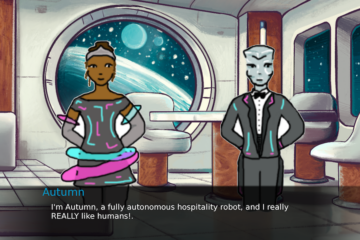You wrote something. It’s good. So good it amazes you. You wonder if you might actually be able to sell this, become an author. You want to show it off. You have a friend who is a published author.
Here is why NOT to ask them to look at it.
Years and years ago, your friend the writer wasn’t a writer. They wrote something. It was good. So good it amazed them. They wondered if they might be able to sell it, to become an author. They showed it to a friend who was a published author.
Published Author frowned and said, “You need structure … see how you bring up ideas and then drop them? And the details … too many, too scattered … it’s an emotional gray.” Then they handed your friend back a manuscript with red ink on nearly every line.
Your friend was crushed. (They also decided Published Author was a jerk and they’d stop being friends with him.) But remember, this is your friend who would go on to become a published author themselves. Because they had something in them that demanded words, a love of words on paper, they wrote another thing, later, that was good, so good it amazed them, and they approached another professional – perhaps a teacher.
“This shows promise, but you are relying on clichés. This whole passage is deeply offensive. Also, I’m losing interest around here… see how you’re repeating ideas? It’s talking heads… there’s no setting, no description.” Another manuscript covered in red ink.
Your friend was crushed a second time. It was exactly as thorough and soul-destroying as the first time.
This repeated, a dozen times, a hundred, during which your friend took classes and developed that “thick skin” we’re all told about but don’t know how to get until it is inflicted. (It always takes longer than you’d think.)
And now… now your friend looks at writing and sees structure or lack thereof, continuity, the relevance of details, the motion of character arcs. For a while, your friend couldn’t read for pleasure, her mind too full of the rules and techniques of crafting sentences to stop analyzing and return to reading.
And so, when you approach her and say, “Can you look at this and tell me if it’s any good?” your friend thinks, “I won’t crush him like my early teachers crushed me! I’ll be encouraging! I’ll tell him what I really needed to hear at that point in my writing!”
And she takes a big breath and says, “First off, you’re summarizing too much, you need to center this in the moment and stick to a single point of view. Don’t move all around… and here, these words aren’t necessary, I’ll just cross them out – see how it reads more smoothly?”
And you are crushed. And YOU decide that that writer is a jerk.
Yes, obviously, I’m the friend in this story. I’ve lived this, time and again, and as I do better in my writing career, more people approach me for advice, and I am more hesitant to answer.
Because, honestly? The short answer to “Is this any good?” is “Yes.”
What people are really asking is: Is it worth my effort to work more on this piece? And the answer to that isn’t in how polished or moving or literary the piece is. The answer is in how much it means to you, how much you need to say something.
If you have to ask, the answer is usually “Yes.”
It reminds me of Rainer Maria Rilke’s famous first letter in the volume “Letters to a Young Poet” – I’ll quote it extensively here because I don’t think anyone could say it better:
You ask whether your verses are any good. You ask me. You have asked others before this. You send them to magazines. You compare them with other poems, and you are upset when certain editors reject your work. Now (since you have said you want my advice) I beg you to stop doing that sort of thing.
You are looking outside, and that is what you should most avoid right now. No one can advise or help you – no one. There is only one thing you should do. Go into yourself.
Find out the reason that commands you to write; see whether it has spread its roots into the very depths of your heart; confess to yourself whether you would have to die if you were forbidden to write.
This most of all: ask yourself in the most silent hour of your night: must I write? Dig into yourself for a deep answer. And if this answer rings out in assent, if you meet this solemn question with a strong, simple “I must”, then build your life in accordance with this necessity; your whole life, even into its humblest and most indifferent hour, must become a sign and witness to this impulse. Then come close to Nature.
Then, as if no one had ever tried before, try to say what you see and feel and love and lose.
I’m not going to go so far as to say you have to re-arrange your life to feed your five page vampire love story, don’t worry. This guy’s a poet. They go over the top of the top.
I digress. Your story is worth pursuing if you decide it is. It is good if you decide it is.
I know, you’re glaring at me. There’s another translation of the question. “Is it any good for PUBLISHING? Can I make some money or reputation off of this?”
To which I say: There is no story so good it will automatically be accepted for publication. Remember, I have had a story sell that was rejected 50 times. I have another story I am still sending out there, that I changed and revised, that’s probably never going to sell, though I personally think it’s the best I’ve ever written. Publication is a goal out of your hands, it relies on the capricious tastes of editors.
BUT, I will also add, that when I was a first-round reader for magazines, there were many well-polished, professional-looking stories that I rejected, and messy, poorly-formatted stories with bad grammar I passed up to second round. The difference was in if they had something to say. If I could feel the love and loss.
There is no story so bad it is not worth something to someone.
So, just take it as a given: Is it any good? Yes. Good luck with it.
Now, excuse me, I’m hella busy.


